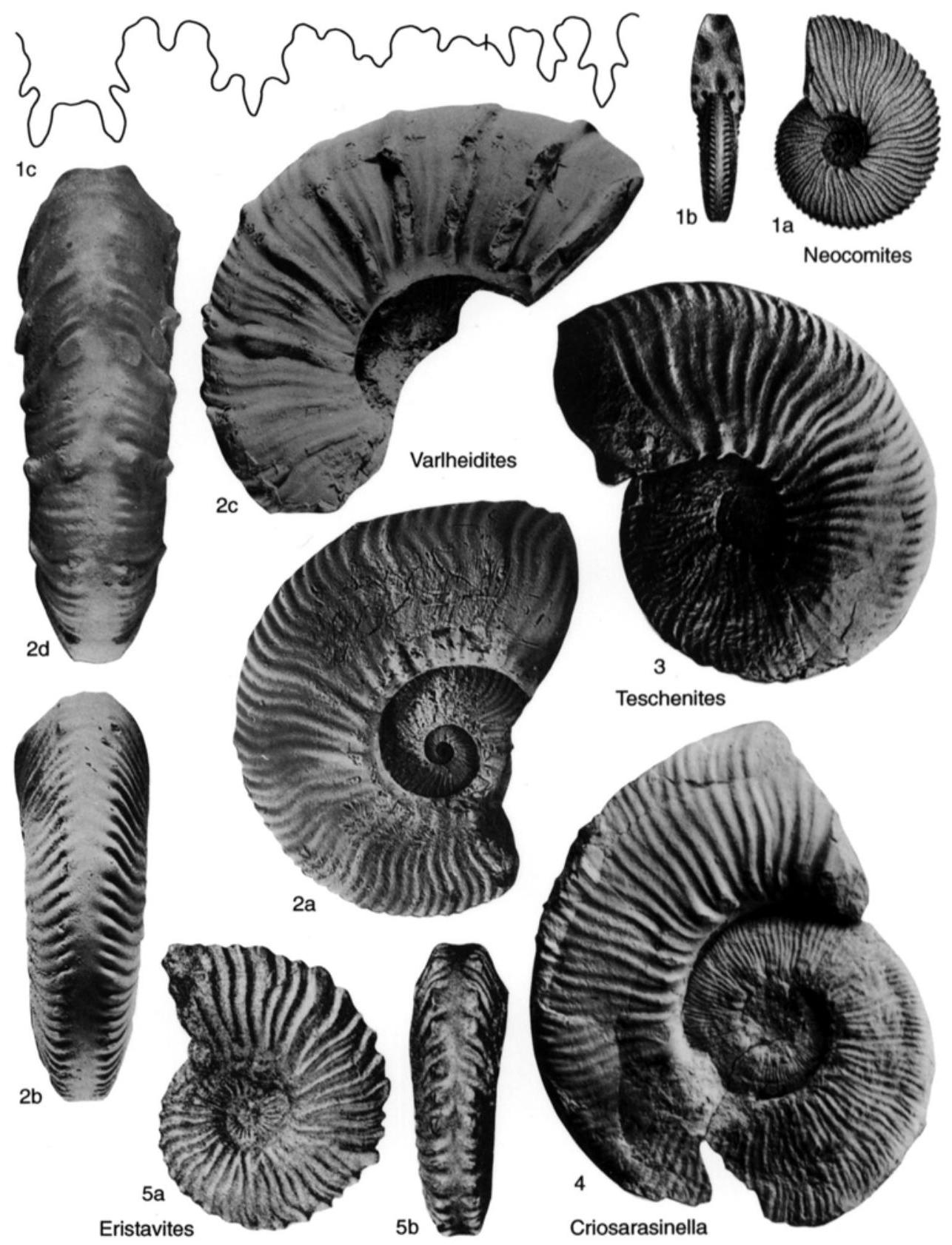Welcome to the Treatise on Invertebrate Paleontology!
Please enter a genera name to retrieve more information.

Neocomites
Classification
Phylum:
Mollusca
Class:
Cephalopoda
Subclass:
Ammonoidea
Order:
Ammonitida
Suborder:
Ammonitina
Superfamily:
Perisphinctaceae
Family:
Neocomitidae
Subfamily:
Neocomitinae
Formal Genus Name and Reference:
Neocomites UHLIG, 1905, p. 620
Type Species:
Ammonites neocomiensis Orbigny, 1841, p. 202, SD SAYN, 1906, p. 122
Images
(Click to enlarge in a new window)
F IG. 43,1a–c. *N. (N.) neocomiensis (O RBIGNY ), Lower Valanginian, France; a,b, ×1 (Orbigny, 1840–1842); c, ×10 (Wiedmann, 1966a).
Synonyms
Busnardoites
Geographic Distribution
southern and central Europe, northern Africa, Israel, Madagascar, Pakistan (Salt Range), Himalayas, Borneo, Sumatra, Texas, Mexico, Peru, Argentina
Age Range
Beginning Stage in Treatise Usage:
Lower Cretaceous (Lower Valanginian)
Beginning International Stage:
Valanginian
Fraction Up In Beginning Stage:
0
Beginning Date:
137.7
Ending Stage in Treatise Usage:
Lower Cretaceous (Lower Hauterivian)
Ending International Stage:
Hauterivian
Fraction Up In Ending Stage:
45
Ending Date:
129.86
Description
Rather involute, with flat sides, ribs flexuous, prorsiradiate, branching in small sheaves from slight umbilical tubercles and generally branching irregularly higher up the side or intercalated, all ribs ending in small, slightly oblique bullae on either side of smooth, flat venter, on later whorls ribs may cross venter more or less transversely. Sutures with large, subsymmetrical, trifid L with parallel sides.
References
Museum or Author Information
Classification
Phylum:
Mollusca
Class:
Cephalopoda
Subclass:
Ammonoidea
Order:
Ammonitida
Suborder:
Ammonitina
Superfamily:
Perisphinctaceae
Family:
Neocomitidae
Subfamily:
Neocomitinae
Formal Genus Name and Reference:
Neocomites UHLIG, 1905, p. 620
Type Species:
Ammonites neocomiensis Orbigny, 1841, p. 202, SD SAYN, 1906, p. 122
Images
(Click to enlarge in a new window)
F IG. 43,1a–c. *N. (N.) neocomiensis (O RBIGNY ), Lower Valanginian, France; a,b, ×1 (Orbigny, 1840–1842); c, ×10 (Wiedmann, 1966a).
Synonyms
Busnardoites
Geographic Distribution
southern and central Europe, northern Africa, Israel, Madagascar, Pakistan (Salt Range), Himalayas, Borneo, Sumatra, Texas, Mexico, Peru, Argentina
Age Range
Beginning Stage in Treatise Usage:
Lower Cretaceous (Lower Valanginian)
Beginning International Stage:
Valanginian
Fraction Up In Beginning Stage:
0
Beginning Date:
137.7
Ending Stage in Treatise Usage:
Lower Cretaceous (Lower Hauterivian)
Ending International Stage:
Hauterivian
Fraction Up In Ending Stage:
45
Ending Date:
129.86
Description
Rather involute, with flat sides, ribs flexuous, prorsiradiate, branching in small sheaves from slight umbilical tubercles and generally branching irregularly higher up the side or intercalated, all ribs ending in small, slightly oblique bullae on either side of smooth, flat venter, on later whorls ribs may cross venter more or less transversely. Sutures with large, subsymmetrical, trifid L with parallel sides.
